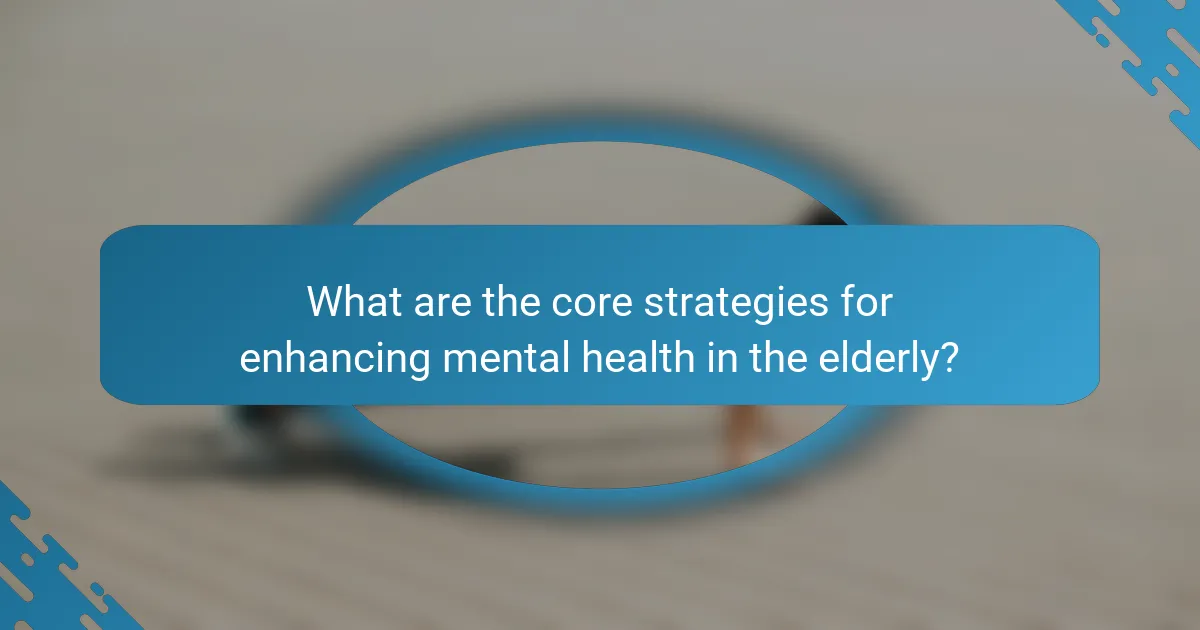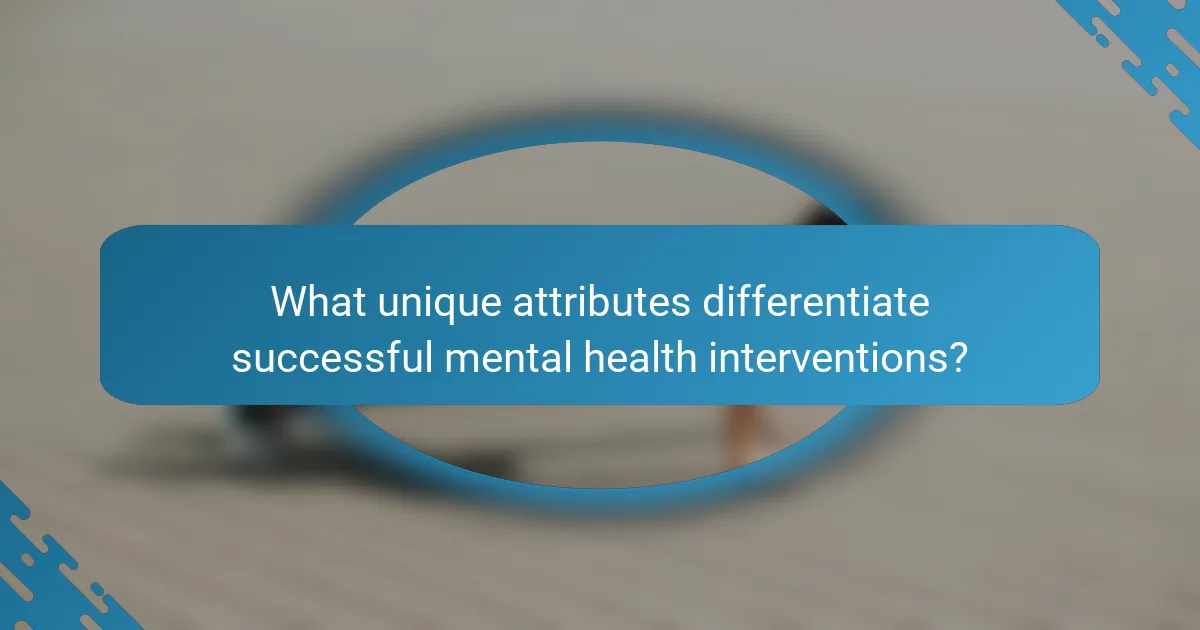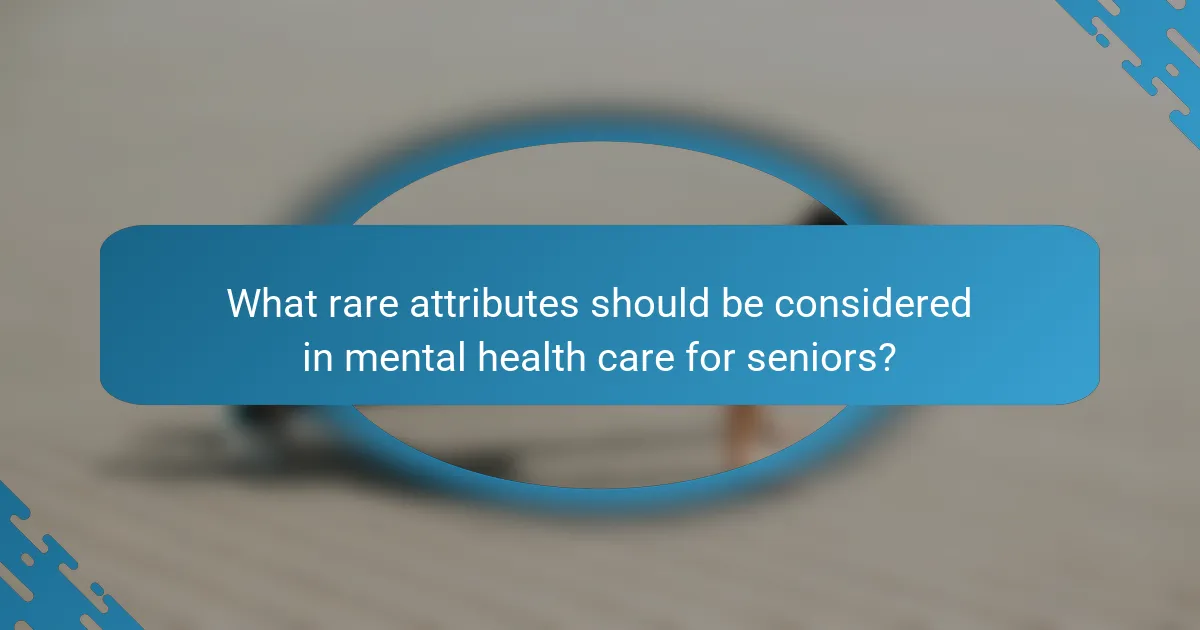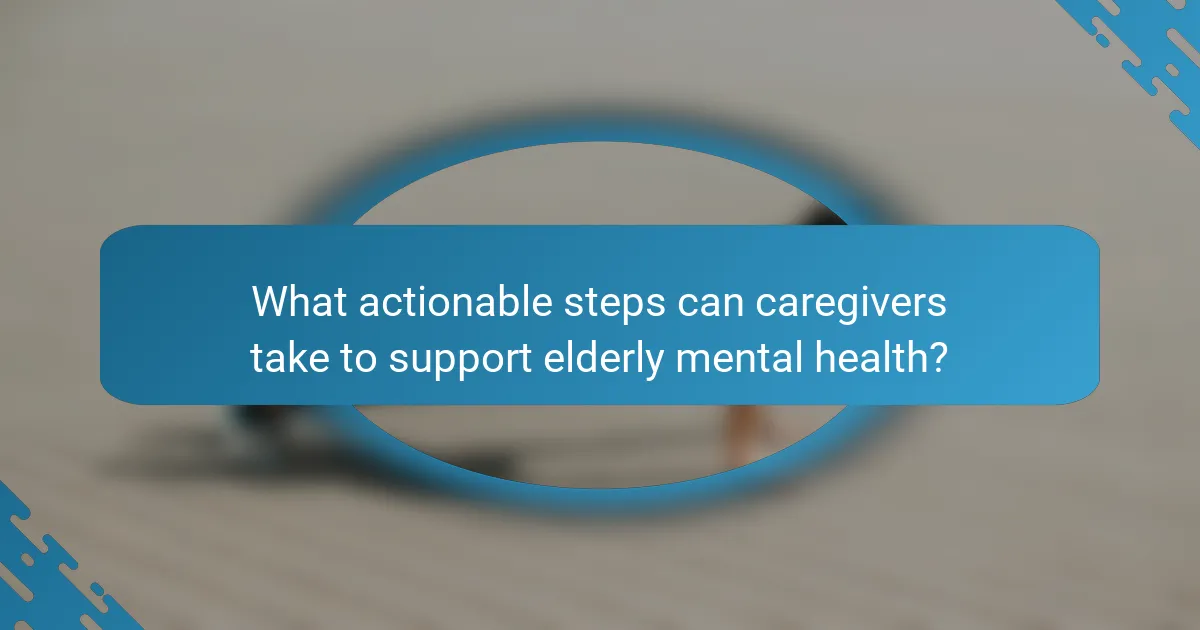Enhancing mental health care for the elderly is crucial for improving their overall well-being and resilience. Key strategies include fostering social connections, promoting physical activity, and ensuring access to mental health resources. Personalized care plans and community integration further enhance engagement and effectiveness. Additionally, unique approaches like sensory stimulation and intergenerational programming can significantly impact emotional well-being.

What are the core strategies for enhancing mental health in the elderly?
Engaging in core strategies enhances mental health in the elderly. These strategies include fostering social connections, promoting physical activity, encouraging mental stimulation, and ensuring access to mental health resources.
Social connections reduce feelings of loneliness and depression, enhancing overall well-being. Regular physical activity improves mood and cognitive function, while mental stimulation through activities like puzzles or reading keeps the mind sharp. Access to mental health resources ensures that elderly individuals receive appropriate support when needed.
Implementing these strategies can significantly improve resilience and quality of life in older adults.
How does social connection influence mental well-being in older adults?
Social connection significantly enhances mental well-being in older adults by reducing feelings of loneliness and promoting emotional support. Engaging in social activities fosters a sense of belonging, which can improve mood and cognitive function. Research shows that older adults with strong social ties experience lower rates of depression and anxiety. Additionally, social interactions can stimulate mental resilience, helping individuals cope with stressors effectively. Prioritising social engagement is crucial for maintaining mental health in aging populations.
What types of social activities are most beneficial?
Engaging in social activities such as group exercises, art classes, and community volunteering significantly enhances mental health for the elderly. These activities foster connection, reduce isolation, and promote resilience.
Group exercises improve physical health while encouraging social interaction. Art classes stimulate creativity and cognitive function, allowing for self-expression. Community volunteering provides a sense of purpose and belonging, further enhancing emotional well-being.
Research indicates that regular participation in such activities can lead to lower rates of depression and anxiety among seniors. Social engagement is a unique attribute of effective mental health strategies, crucial for maintaining overall wellness.
How can family involvement improve mental health outcomes?
Family involvement significantly enhances mental health outcomes for the elderly. Engaging family members fosters emotional support, reduces feelings of isolation, and encourages adherence to treatment plans. Studies show that elderly individuals with active family participation experience improved mood and cognitive function. Additionally, family dynamics can provide a unique attribute of resilience, helping seniors navigate challenges more effectively. As a result, integrating family into mental health strategies promotes overall well-being and connection.
What role does physical activity play in mental health support?
Physical activity significantly enhances mental health in the elderly by reducing symptoms of anxiety and depression. Regular exercise promotes the release of endorphins, improving mood and cognitive function. Social engagement through group activities further fosters a sense of community, combating loneliness. Studies show that even light physical activity, such as walking, can yield substantial mental health benefits. Engaging in consistent physical activity also builds resilience, helping elderly individuals cope with stress more effectively.
What forms of exercise are most effective for seniors?
Strength training, walking, swimming, and yoga are effective exercises for seniors. These activities enhance physical health, improve balance, and boost mental well-being.
Strength training builds muscle and bone density, reducing injury risk. Walking promotes cardiovascular health and social interaction. Swimming offers low-impact resistance, beneficial for joint health. Yoga enhances flexibility and mental resilience, reducing stress levels.
Incorporating these exercises into a routine can significantly enhance seniors’ overall quality of life. Regular engagement fosters connection and resilience, essential for mental health care strategies.
How can walking groups enhance both physical and mental health?
Walking groups significantly enhance both physical and mental health for the elderly. They promote social interaction, which reduces feelings of loneliness and depression.
Engaging in regular walking with peers improves cardiovascular fitness and muscle strength. Studies show that group activities can lead to a 30% increase in physical activity levels among seniors.
Additionally, walking groups foster a sense of community, which enhances emotional resilience. Participants often report improved mood and reduced anxiety.
The unique attribute of walking groups is their dual focus on physical exercise and social support, making them an effective strategy for elderly mental health care.
What unique challenges do elderly individuals face regarding mental health?
Elderly individuals face unique challenges regarding mental health, including isolation, cognitive decline, and chronic illness. These factors can exacerbate feelings of depression and anxiety, making it essential to implement targeted strategies for care. Social connections are vital; studies show that maintaining relationships can significantly improve mental well-being. Additionally, tailored interventions, such as cognitive therapies and physical activities, enhance resilience and overall quality of life. Addressing these challenges requires a comprehensive approach that fosters connection and promotes mental health among the elderly.
How do cognitive decline and mental health interrelate?
Cognitive decline and mental health significantly interrelate, as cognitive impairments can lead to increased feelings of depression and anxiety in the elderly. Research indicates that 20-30% of older adults experience depression, often exacerbated by cognitive challenges. Maintaining social connections and engaging in mentally stimulating activities can enhance resilience and overall well-being, countering the effects of cognitive decline. Promoting regular mental health check-ups is essential for early detection and intervention, thus improving quality of life for seniors.
What are the common mental health disorders affecting the elderly?
Common mental health disorders affecting the elderly include depression, anxiety, dementia, and schizophrenia. Depression often manifests as persistent sadness and loss of interest, impacting overall well-being. Anxiety disorders can lead to excessive worry, affecting daily functioning. Dementia, characterized by cognitive decline, significantly alters memory and behaviour. Schizophrenia, though less common, can occur and may lead to distorted thinking and perceptions. Addressing these disorders is crucial for enhancing elderly mental health care and promoting resilience.

What universal attributes contribute to effective mental health strategies?
Effective mental health strategies for the elderly focus on promoting connection, resilience, and well-being. Universal attributes include social engagement, regular physical activity, and access to mental health resources. These elements foster a supportive environment, enhancing emotional stability and reducing isolation. Additionally, tailored interventions addressing unique needs can significantly improve outcomes. Implementing these strategies leads to better mental health and quality of life in elderly populations.
How do routine and structure impact mental health in older adults?
Routine and structure significantly enhance mental health in older adults by providing stability and predictability. Engaging in regular activities fosters a sense of purpose and reduces feelings of anxiety and depression. Studies indicate that structured daily routines can improve cognitive function and emotional well-being.
Moreover, social connections formed through routine activities, such as group exercises or community events, combat isolation, a common issue in older populations. These interactions contribute to resilience, enabling seniors to cope better with life’s challenges.
Incorporating elements like physical exercise, hobbies, and social gatherings into daily routines can lead to improved mental health outcomes. As a result, caregivers and families should prioritise establishing consistent schedules to support the mental well-being of older adults.
What is the significance of regular mental health screenings?
Regular mental health screenings are vital for early detection and intervention in elderly individuals. These screenings enhance well-being by identifying issues before they escalate, fostering resilience and connection within communities. Studies show that proactive mental health assessments can reduce the prevalence of depression and anxiety among seniors, significantly improving their quality of life. Furthermore, regular screenings encourage open discussions about mental health, reducing stigma and promoting a supportive environment.
How can technology facilitate mental health support for seniors?
Technology can significantly enhance mental health support for seniors by providing accessible resources and fostering connections. Digital platforms offer virtual therapy, allowing seniors to engage with mental health professionals from home. Mobile applications provide tools for mindfulness and stress management, promoting emotional well-being.
Telehealth services have increased access to mental health care, reducing barriers such as transportation. Moreover, social media and community forums encourage interaction, combating loneliness. Wearable devices can monitor health metrics, alerting caregivers to potential issues.
These technological solutions empower seniors, enhancing their resilience and overall mental health. They allow for personalised care tailored to individual needs, contributing to improved outcomes.
What digital tools are available for mental health monitoring?
Digital tools for mental health monitoring include mobile apps, wearable devices, teletherapy platforms, and online assessments. These tools help track mood, provide resources, and facilitate communication with healthcare providers. Popular apps like Headspace and Calm focus on mindfulness, while platforms like BetterHelp offer remote therapy. Wearables can monitor physiological data, providing insights into mental well-being. These technologies enhance elderly mental health care by promoting self-awareness and connection.

What unique attributes differentiate successful mental health interventions?
Successful mental health interventions for the elderly are distinguished by their personalised approaches, community integration, and evidence-based practices. These unique attributes enhance engagement and effectiveness. Personalised care plans cater to individual needs, fostering a sense of ownership. Community integration promotes social connections, reducing isolation. Evidence-based practices ensure interventions are grounded in research, improving outcomes. Together, these elements create a comprehensive framework that supports elderly mental health.
How does personalised care enhance mental health outcomes?
Personalised care significantly enhances mental health outcomes for the elderly by tailoring interventions to individual needs. This approach fosters a sense of belonging, improves emotional well-being, and strengthens resilience. Research shows that personalised strategies, such as one-on-one therapy and customised activity programmes, lead to better engagement and satisfaction. As a result, elderly individuals experience reduced symptoms of depression and anxiety, ultimately improving their quality of life. Personalised care also encourages social connections, which are vital for mental health in older adults.
What innovative therapies are emerging for elderly mental health?
Innovative therapies for elderly mental health include art therapy, cognitive-behavioral therapy, and virtual reality interventions. These approaches enhance emotional well-being and foster social connections. Art therapy encourages self-expression, while cognitive-behavioral therapy addresses negative thought patterns. Virtual reality offers immersive experiences that can reduce anxiety and improve mood. These therapies support resilience in aging populations, promoting mental health and quality of life.

What rare attributes should be considered in mental health care for seniors?
In mental health care for seniors, consider rare attributes like sensory stimulation, intergenerational programming, and culturally tailored interventions. These strategies enhance emotional well-being and foster connections. Sensory stimulation can improve cognitive function, while intergenerational programs encourage social interaction and reduce isolation. Culturally tailored interventions address unique backgrounds, ensuring relevance and effectiveness in care.
How can cultural sensitivity improve mental health support?
Cultural sensitivity enhances mental health support by fostering trust and understanding. It allows caregivers to tailor interventions to individual backgrounds, promoting better communication and engagement. This approach can lead to improved outcomes in elderly mental health care, as culturally aware strategies address unique needs and preferences. By recognising diverse experiences, mental health providers can create inclusive environments that encourage resilience and connection among elderly individuals.
What are the implications of co-occurring physical and mental health issues?
Co-occurring physical and mental health issues significantly impact elderly individuals’ overall well-being. These dual challenges can exacerbate symptoms, complicate treatment, and reduce quality of life.
Elderly patients with both conditions often experience higher levels of pain and distress, leading to increased healthcare costs. For example, studies show that depression in older adults can worsen chronic illnesses like diabetes or heart disease, creating a cycle of decline.
Addressing these co-occurring issues requires integrated care approaches that consider both physical and mental health needs. This strategy enhances resilience and fosters better health outcomes, promoting a holistic view of elderly mental health care.

What actionable steps can caregivers take to support elderly mental health?
Caregivers can enhance elderly mental health by fostering social connections, encouraging physical activity, and promoting cognitive engagement. Establish regular communication to reduce feelings of isolation. Engage in activities like walking or gardening to boost mood and physical health. Introduce brain games or reading to stimulate cognitive function.
What are the best practices for creating a supportive environment?
Creating a supportive environment for elderly mental health care involves fostering connection, promoting resilience, and enhancing overall well-being. Key practices include encouraging social interactions, offering emotional support, providing structured routines, and ensuring accessibility to mental health resources.
1. Foster Social Connections: Organise group activities that encourage engagement and reduce isolation.
2. Provide Emotional Support: Train caregivers to recognise and respond to emotional needs effectively.
3. Establish Routines: Create predictable daily schedules that promote a sense of stability and security.
4. Ensure Resource Accessibility: Make mental health services easily available and tailored to elderly needs.
What common mistakes should be avoided in elderly mental health care?
Common mistakes in elderly mental health care include neglecting individualised treatment plans, overlooking the importance of social connections, and failing to recognise signs of mental health issues. Prioritising generic approaches can diminish the effectiveness of care. Additionally, caregivers often underestimate the impact of medication side effects on mental health. Fostering open communication and encouraging active participation in care decisions can enhance outcomes.
How can caregivers advocate for better mental health resources?
Caregivers can advocate for better mental health resources by actively engaging with healthcare systems and policymakers. They should gather data on the mental health needs of the elderly, highlighting gaps in current services. Establishing support networks among caregivers can amplify their voices and increase awareness of these issues. Collaborating with mental health professionals to develop tailored programmes will ensure resources meet the unique needs of elderly individuals.